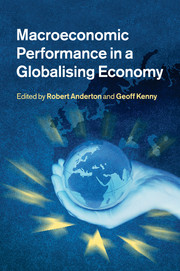Book contents
- Frontmatter
- Contents
- List of figures
- List of tables
- Notes on contributors
- Foreword by Jürgen Stark
- Acknowledgements
- 1 Globalisation and macroeconomic performance
- 2 The impact of globalisation on the euro area macroeconomy
- 3 Trade and foreign direct investment in business services: a modelling approach
- 4 Entry dynamics and the decline in exchange-rate pass-through
- 5 Does the exchange rate belong in monetary policy rules? New answers from a DSGE model with endogenous tradability and trade frictions
- 6 Globalisation and inflation in the OECD economies
- 7 Globalisation and euro area prices and labour markets: some evidence on the impact of low-cost countries
- 8 Monetary policy strategy in a global environment
- 9 Monetary policy in a global economy: past and future research challenges
- Index
- References
1 - Globalisation and macroeconomic performance
Published online by Cambridge University Press: 04 February 2011
- Frontmatter
- Contents
- List of figures
- List of tables
- Notes on contributors
- Foreword by Jürgen Stark
- Acknowledgements
- 1 Globalisation and macroeconomic performance
- 2 The impact of globalisation on the euro area macroeconomy
- 3 Trade and foreign direct investment in business services: a modelling approach
- 4 Entry dynamics and the decline in exchange-rate pass-through
- 5 Does the exchange rate belong in monetary policy rules? New answers from a DSGE model with endogenous tradability and trade frictions
- 6 Globalisation and inflation in the OECD economies
- 7 Globalisation and euro area prices and labour markets: some evidence on the impact of low-cost countries
- 8 Monetary policy strategy in a global environment
- 9 Monetary policy in a global economy: past and future research challenges
- Index
- References
Summary
Introduction
The term ‘globalisation’ is generally accepted to refer to the process of steadily increasing interdependence of national economies via trade, production and financial market linkages. While this process has been ongoing for many centuries, few would doubt that it has accelerated and intensified in the last decades. This acceleration is evidenced as much by the strong synchronicity in the rapid transmission of financial crises starting in late 2007, and the subsequent global economic downturn, as by the decade of almost unprecedented growth in international trade and financial market liberalisation that preceded it.
Two key elements stand out as the driving forces behind this increased interdependence. First, the barriers to trade as well as the costs of transporting goods, services – including financial services – and information across the globe have been reduced considerably. This development has been inextricably linked to rapid advances in information and communication technology. Second, there has been a significant expansion in global economic activity linked to the opening up of emerging economies to international trade and production, notably the greater involvement of emerging Asia in world trade, as well as Central and Eastern Europe following the collapse of the Soviet Union. The economic globalisation brought about by these changes has been one of the major trends shaping the world economy over recent years. On the real side, international trade has expanded substantially, with the emerging Asian economies in general – and China in particular – taking a prominent role.
- Type
- Chapter
- Information
- Macroeconomic Performance in a Globalising Economy , pp. 1 - 13Publisher: Cambridge University PressPrint publication year: 2010
References
- 2
- Cited by



